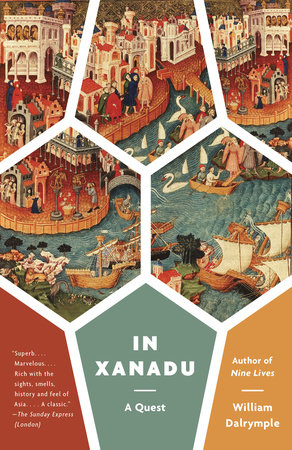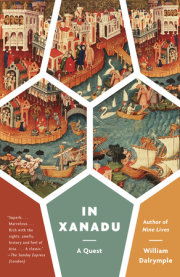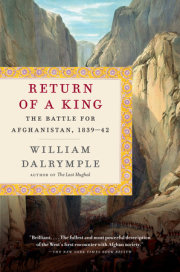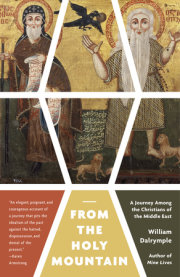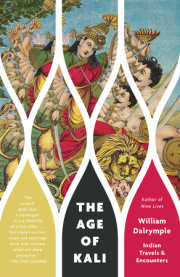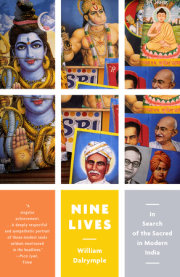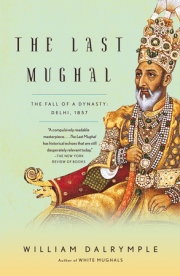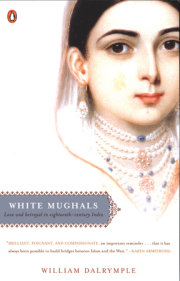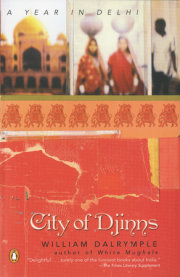It was still dark when I left Sheik Jarrah. Atthe Damascus Gate the first fruit sellers were gathered by a brazier, warmingtheir fingers around glasses of sweet tea. The Irish Franciscan was waiting bythe door of the Holy Sepulchre. He nodded from under the hood of his habit andwithout a word led me past the Armenian chapel and under the great rotunda.Around the dome you could hear the echo of plainchant as twelve separatecongregations sang their different matins.
‘It’s not long now: said Brother Fabian. ‘TheGreeks will be finished by eight-thirty.’
‘That’s in two hours’ time.’
‘Only half an hour. The Greeks don’t allow us toput the clocks back. We work on Byzantine time here.’
He knelt down on a flagstone, folded his handsin his sleeves and began murmuring his devotions. We waited for twenty minutes.
‘What’s keeping them?’
‘The rota’s very strict. They’re allowed fourhours in the tomb, and they won’t leave until their time is up.’
He hesitated then added:
‘Things are a bit tense at the moment. Lastmonth one of the Armenian monks went crazy: thought an angel wastelling him to kill the Greek patriarch. So he smashed an oil lamp and chasedPatriarch Diodorus through the choir with a piece of broken glass.’
‘What happened?’
‘The Greeks overpowered him. There’s anex-weightlifter from Thessaloniki who looks after the Greek chapel on Calvary.He pinned the Armenian down in the crypt until the police came. But since thenthe Greeks and the Armenians haven’t been on speaking terms. Which means we hadto be the go-betweens. Until we broke off relations with the Greeks as well.’
‘What do you mean?’
‘Last month Diodorus was crossing the bridgeinto Jordan when the border guards found a big bag of heroin in the air filterof his car. They released him but arrested his driver. Diodorus claimed he musthave put the bag there. The driver was a Catholic.’
‘So now no one is speaking to anyone?’
‘I think the Copts are still speaking to theMaronites. But apart from that, no.’
Brother Fabian pulled one arm out of his habitand pointed to the dome of the rotunda.
‘You see the painter’s scaffolding? That’s beenup ten years because the three patriarchs can’t agree on a colour. They’d justabout settled on black when the Armenian assaulted Diodorus. Now the Greeks aredemanding purple. It won’t get repainted for another ten years now. By whichtime: added Fabian, ‘I shall be back in Donegal.’
At that moment a procession of black-clad Greekmonks emerged from the Tomb, a bulbous, kettle-like structure which Robert Byronthought resembled a railway engine. As the monks stepped out some were singinganthems while others sprayed the ambulatory with holy water. They had cascadingpepper-and-salt beards and wore cylindrical hats topped with blackmortarboards. They scowled in the direction of the Latin chapel then marchedoff towards Calvary.
‘Wait here: said Brother Fabian.
He returned carrying a tin watering can and atray of what looked like surgical instruments. He handed me the tray thenwalked up to the tomb, bowed, bent double and squeezed under the low, cuspedarch. 1 followed. We passed through the dim first chamber, then stooped intothe inner sanctum. The holiest shrine in Christendom was the size of a smallbroom cupboard. Raised on a ledge was the Stone of Resurrection and on top ofit rested two icons, a tatty Mannerist painting and a vase containing sevenwilted roses. Twelve lamps were suspended from the ceiling by steel chains.Fabian knelt down, kissed the Stone and murmured a prayer. Then he rose.
‘We’ve got until twelve-thirty,’ he said.
From a recess in the first chamber he produced asmall stepladder. He climbed up onto it, unclipped a hook from the wall-ringthen let go of the pulley. The four Catholic lamps descended. They were made ofbeaten bronze and were very tarnished and very old. Finely incised on theoutside were the figures of cherubim and a six-winged seraph. Motioning that Ishould pass the watering can up to him, the friar arched over the lamps andvery carefully poured oil from the can into three of them. As he did so eachone guttered.
‘I thought these lamps were miraculous. They’resupposed to be eternal flames.’
‘That’s what they say,’ said Brother Fabian, nowstruggling with the wick of one of the lamps. ‘But you try and change the oilwithout them going out. Take it from me. It’s absolutely impossible. Damn it!This wick’s finished. Pass me up the string.’
He pointed to the tray of surgical instruments.I found a ball of string and passed it to him.
‘So there is nothing miraculous about theselamps?’
‘Nothing at all. Pass the scissors.’
‘What about the oil itself? Is it chrism? Oliveoil from the Mount of Olives?’
‘No it’s ordinary sunflower oil. Comes from abox in the sacristy. Damn this lamp! We’ll have to have a new float. Pass oneup will you?’
‘Float?’
‘One of those cork things.’
I passed him a spare from the tray.
‘Where’s the girl?’ asked Fabian from theladder.
‘I don’t know. Probably asleep.’
‘Is she your ... friend?’
‘What do you mean?’
Fabian winked at me.
‘You know....’
‘She’s not my girlfriend, if that’s what youmean.’
‘And who’s this Italian you were looking for?’
‘Polo?’
‘That’s the one.’
‘He’s ... different.’
‘And he told you this oil was miraculous?’
‘I suppose he did, indirectly.’
‘Well you can tell him from me it’s quiteordinary.’
‘That would be a little difficult.’
Fabian let this pass.
‘You say he took this oil east with him?’ hecontinued.
‘Yes.’
‘What did he carry it in?’
‘I don’t know. A goatskin flask, perhaps.’
‘He’d be a bit old fashioned then.’
‘A bit.’
Fabian put the finishing touches to his newwick, put it back in the oil then lit it from the one remaining ungutteredlamp.
‘You still want some of this oil?’
‘Please.’
I handed him a small plastic phial.
‘Not goatskin.’
‘No. It comes from the Body Shop in CoventGarden.’
Fabian took the bottle, removed the top, andcarefully dipped it in the sump of the fourth lamp. It filled, slowly. Then hehanded it back to me.
‘Good luck finding your friend.’
Marco Polo came to the Holy Sepulchre in theautumn of 1271. Jerusalem had finally been lost to Islam thirty years previously,and the Sepulchre would have been semi-derelict when Polo saw it. The Turks whocaptured Jerusalem in 1244 had butchered the priests inside, desecrated the tombsof the Kings of Jerusalem, and burned the church to the ground.
Since then, the city had passed into the handsof the Mameluke Sultan, Baibars I, an upwardly mobile ex-slave who had oncebeen returned to the market place by a dissatisfied buyer on account of hisexcessive ugliness. By the time Polo came to the Levant ten years later he hadmade himself the most feared and most powerful figure in the Middle East,defeating the Mongols and driving them back east of the Euphrates.
At the same time Baibars was slowly andmethodically evicting the crusaders from their last toe-hold on the coast ofPalestine. As I passed through the St Stephen’s Gate on my way back to SheikJarrah I saw an emblem of Baibars’ placed high above the portal. It must havebeen newly carved when Polo arrived in Jerusalem. The symbol was a pair oflions rampant about to attack a small rat. The lions, which were shown withpowerful haunches, long claws and magnificent heraldic tails, representedMameluke Egypt; the cornered rat, the crusaders. It was a sadly accuratepicture: in 1263 Baibars had sacked Nazareth and burned the outskirts of Acre.The following year the crusader fortresses of Caesarea, Arsuf and Athlit allfell before his siege engines. In 1268 Antioch was captured by Baibars after asiege ofonly four days. But it was in the spring of 1271 that the crusadersreceived their greatest shock. Krak des Chevaliers, the headquarters of theKnights Hospitallers, was considered by all sides to be impregnable; in 1188 ithad defied even Saladin. But on March the third Mameluke troops appearedunexpectedly below the castle, and soon the fortress was invested. Despiteheavy spring rains arbalesters were brought up the hill from the valley bottomand after a short bombardment the Egyptians broke into the lower ward. Thedepleted garrison of three hundred fought on for another month until, on Aprilthe eighth, they surrendered, having received a forged order to do so,purporting to come from the Grand Master of the Hospitallers in Tripoli.
The loss of Krak was as great a boon to theprestige of Baibars as it was a blow to that of the Franks. Yet Acre, thecapital of the Crusader Kingdom since the fall of Jerusalem, was at thiscritical point in a state of vigorous civil war. None of the crusaders wastaking an even remotely responsible attitude to the survival of the Kingdom:this was left to the Papal Legate, Theobald of Piacenza. Theobald was a man ofgreat severity and dignity, a friend of St Thomas Aquinas and a confidant ofthe kings of England and France. Appointed Archdeacon of Liege, he left hisposition and retired to the Holy Land after disagreements with his bishop whowas attempting to turn the Liege episcopal palace into a bordello. In AcreTheobald succeeded in negotiating a temporary truce between the Genoese andVenetians, and persuading the local nobility to cooperate with Prince Edward ofEngland who had just arrived at the head of an English crusade. But he lackedthe authority or the power to do anything more radical to save the Kingdom.Then, in the late August of that year, Theobald was elected to the papacy. Heheard of his appointment in early September and took the name Gregory X.
Gregory realized that the only possible hope forthe crusaders was to make some sort of pact with the Mongols with whom theyshared a common Egyptian enemy. Not only did this make good strategic sense,there were growing indications that Kubla Khan was considering embracingChristianity. This was not as unlikely a proposition as it sounded. There weremany Eastern Christians among the Mongol ranks and already there had beenmilitary cooperation between Bohemond, the crusader Prince of Antioch, andHulagu, the Mongol Prince of Persia. But Gregory had conceived a more daringand ambitious plan than simple cooperation. He wished to convert the Mongols toChristianity and to turn the Great Khan Kubla into the spiritual son of theRoman Pontiff. The Mongol Empire ranged from the Euphrates to the Pacific; itwas the largest empire the world had ever seen. Gregory understood that if itcould be turned into a Christian empire, the days of Islam would be numberedand the Crusader Kingdom saved.
Gregory’s first action as Pope was thus torecall to Acre a Venetian galley that had just arrived at Ayas in Asia Minor.On board were two Venetian brothers, Niccolo and Maffeo Polo along with Niccolo’sseventeen-year-old son, Marco. Two years previously, in the spring of 1269, thetwo elder Polos had suddenly appeared in Acre. They said they had just returnedfrom Xanadu, the summer palace of Kubla Khan on the Mongolian steppe. They werethe first Europeans ever to claim to have travelled so far east, and their taleappeared to be true. When they were brought before Gregory (then still PapalLegate) they told him their remarkable story and showed him the Tablets of Goldgiven to them by Kubla Khan. On these were inscribed orders that the Polosshould be ‘supplied with everything needful in all the countries through whichthey should pass – with horses, with escorts, and, in short, with whatever theyshould require’. According to the brothers, Kubla Khan was a man of ratherdifferent temperament to his grandfather Ghengis. He had shown great interestin Christianity and had given them a letter in which he asked the Pope to sendhim ’a hundred persons of the Christian faith; intelligent men, acquainted withthe Seven Arts, and able clearly to prove to idolaters and other kinds of folk,that the Law of Christ was best, and that all other religions were false and nought’.The brothers said that if they could prove this, Kubla lilian and all hissubjects would become Christians. The Khan had also asked the brothers to bringback to him what he had heard was the most sacred of Christian relics, a sampleof oil from the famous lamps which burned in the Holy Sepulchre.
The Legate realized that this was a crucialchance for Christendom. But in 1269 there was no Pope, as Clement IV had justdied and the cardinals had yet to summon the energy to meet and choose hissuccessor. The Polos had no choice but to go to Venice and wait until a Popewas elected. By the spring of 1271, despite mounting public indignation, thecardinals appeared to be no nearer reaching a decision. Seeing this, the Polosdecided to return to Acre, this time with Marco. There they announced to theLegate that Pope or no Pope they were going to return to the Khan ‘for we havealready tarried long, and there has been more than enough delay’. They set offeast in the last days of August.
Meanwhile in Viterbo the papal election hadturned into an international scandal. In order to speed a decision, the civicauthorities had locked the cardinals in the Papal Palace, threatened a starvationdiet and removed the roof to allow the divine influences to descend more freelyon their counsels’. This unusual approach to the workings of the Holy Spiritproved a surprising success. The cardinals delegated the decision to acommittee of six who, anxious to get away, elected Theobald that same day. Aweek later news of the decision reached Acre and the Polos were recalled. Thenew Pope immediately gave them permission to go to Jerusalem to fetch the HolyOil. He also provided the expedition with, if not one hundred, then at leastwith two intelligent men of the Christian faith, Friar Nicolas of Vicenza andFriar William of Tripoli, the two most senior friars in the Holy Land. PopeGregory gave to the friars extraordinary powers of ordination and absolution,and to the Polos letters and presents for the Great Khan. The party, now fivestrong – the two elder Polos, Marco, and the two friars – finally departed inearly November.
Copyright © 2012 by William Dalrymple. All rights reserved. No part of this excerpt may be reproduced or reprinted without permission in writing from the publisher.

